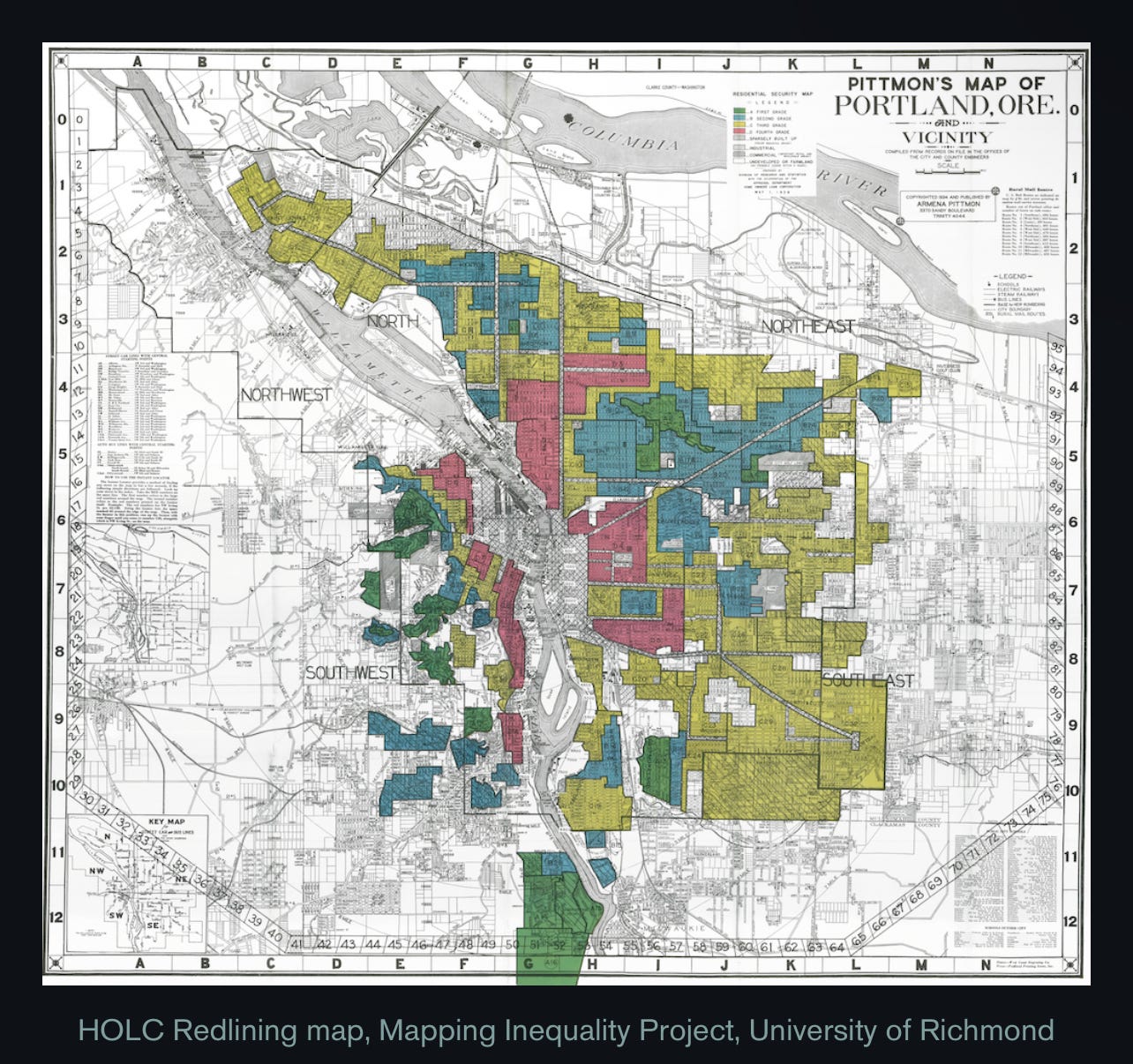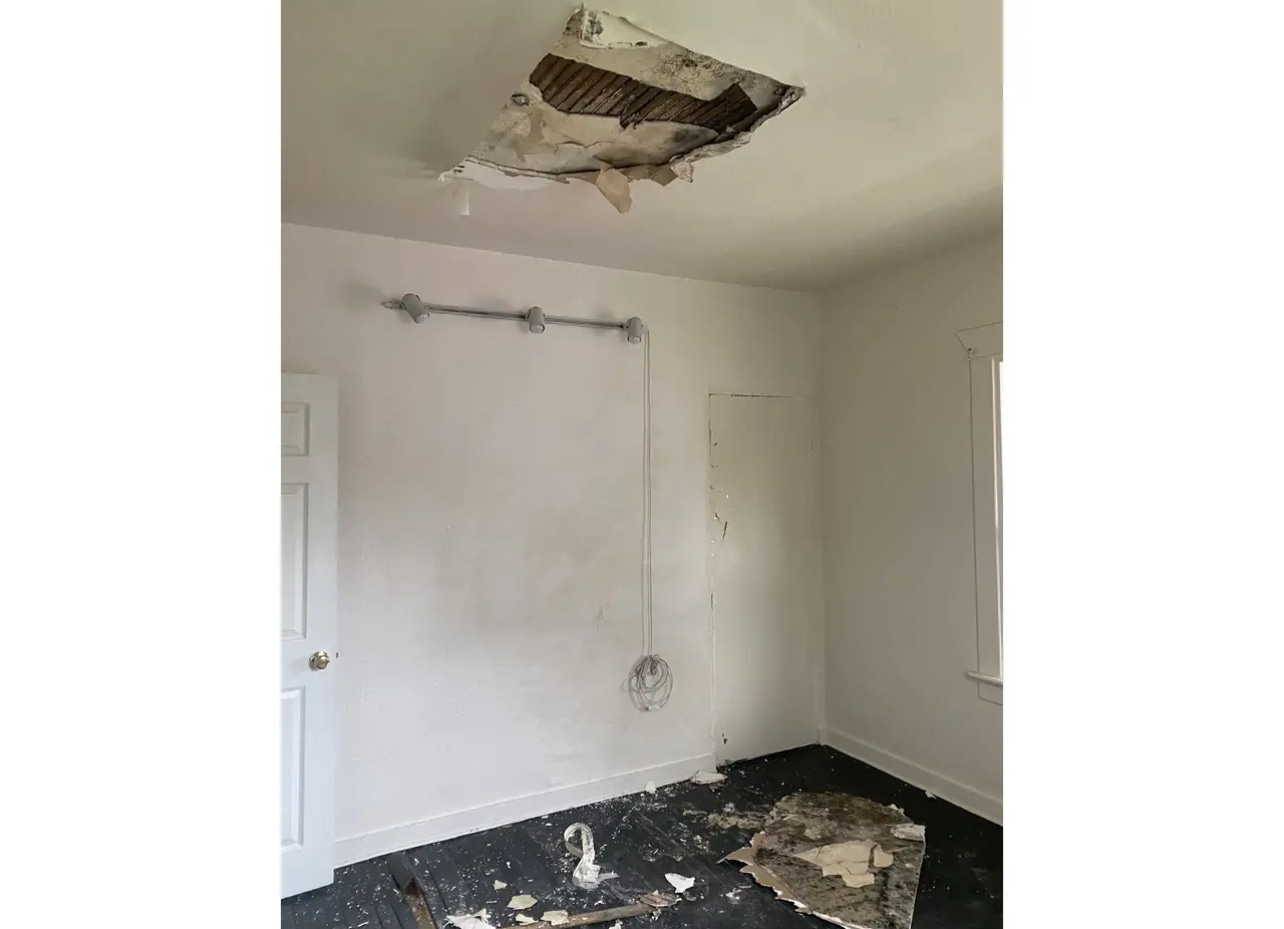PDX HSP 2: ‘I just want a janky old house that I can fix up’
Where the single dad meets a navigator from Portland's Housing Solidarity Project
This is the second in a series of four stories about the PDX HSP, a volunteer-run organization that collects and distributes housing reparations for local Black and Indigenous people. The series opener and its supplemental podcast are here.
“I had been waiting for a ballot measure,” said Lily Copenagle. Then we burst out laughing over our Zoom call. We’ve both seen enough not to expect American voters to pass reparations for Black and Indigenous people—in a non-shit-show fashion—before, say, getting a handle on greenhouse gas emissions.
“He wanted to put himself—his skills and all of his talents—into a home that he and his family could live in and actually experience the work that he produced with his hands.”
Most white Americans cannot begin to quantify their privilege. That’s not an issue for Copenagle, 50. Throughout Copenagle’s childhood in Northeast Portland—predominately Black back then—she noticed that her Black peers and friends were treated differently from her, had less opportunity than her.
She all but grew up thinking about reparations. The girl’s family dinner table was a wide-open forum of debate, and there was no intellectual barrier to understanding what happened before their eyes. It’s no surprise that Copenagle now works by day as a research scientist with the Equity Analytics group, where she analyzes equity efforts and interventions.
Copenagle realized racial reparations didn’t have to be some down-the-road wish in 2022, when she learned online about the Portland Housing Solidarity Project. Copenagle reached out and was asked to navigate Dayrel Poindexter, a single father with whom she would get along swimmingly. The young engineer was handy as is she, and they vibed out over that.
“He wanted to put himself—his skills and all of his talents—into a home that he and his family could live in and actually experience the work that he produced with his hands,” she said.
Copenagle and her husband were out walking their dog one night last winter. A cute empty house not far from their home. Cute houses rarely stayed empty amid this hot real estate, so it made sense to look inside. She and Dayrel hadn’t yet found anything that came close to fitting the bill. So she and her husband stopped.
Copenagle could see water damage through a window. Copenagle deduced that some pipes had burst in an upstairs bathroom, ruining the ceiling of the room below. She thought about something Dayrel Poindexter had told her very early in their home buying journey:
“I just want a janky old house that I can fix up over time.”
Navigators are key to making the volunteer-run PDX HSP function. Two work with redistributors in gathering funds and four connect with homebuyers. A navigator like Lily’s guidance job is to help through the singular process of purchasing a first home. Some of the Indigenous and Black people only want the money. Some housing reparations recipients want their navigator at every broker and grant provider meeting. They want them to take notes and fill out forms.
HSP co-founder Allison Brinkhorst does the other kind. We met early on a dark, rainy evening at the Nite Hawk, by the Rosa Parks train stop in North Portland. She speaks softly enough that my tape recorder couldn’t pick up her voice above the cafe din and my first notes with her are total crap. She has a sweetly midwestern affect.
Brinkhorst navigates from HSP’s Organizing People with Wealth subcommittee. OPW puts together co-working sessions and workshops, sends bimonthly emails to a list of people interested in redistributing, and sets up one-on-one discussions.
“It’s been such a mind-exploding thing for me, how many ways there are to do this,” one redistributor told me. “And the longer I am in this group and the longer that I talk about this, the more ideas get generated.”
After Annie Moss sold her house to Randal Wyatt, she began getting email from folks who heard about the deal and wanted to duplicate the act. They simply didn’t know how. In early 2021, Wyatt, Brinkhorst and their connections formed a group, privately, and began to examine what might be their niche.
The redress that Poindexter and about 10 other Black and Indigenous Portlanders like him have received is not without precedent, Brinkhorst explained. Resource Generation is one HSP precursor. The Northwest cohort of The Social Justice Fund holds a lot of influence and has a lot of success to show for it. Locally, groups doing anti-displacement funds already existed. Wyatt’s new group Taking Ownership was addressing the repair aspect of housing reparations.
In getting tangible results for the people with whom they are making amends, the HSP often enlists REPAIR, Real Estate Professionals Against Institutional Racism. Pretty sure I’m not the only one calling them The Woke Realtors.
Success on the OPW side of the Housing Solidarity Project, Brinkhorst explains, “takes relationships and building connections with like-minded white people, or people with wealth and privilege, and starting to ask, ‘how would you like to engage in this kind of work?’”
Some redistributors are ninety percenters, but many are not. When they speak about the fulfillment that housing wealth redistribution has brought them it doesn’t sound like any other feeling on the United States’ emotional menu.
After the cafe conversation ended and Allison took off, I went to take care of the tab and learned that she had paid it. And I immediately started to spiral, trying to quantify the myriad things my white friends do to keep my poor Black ass from expiring. Then the Get Out part of my brain asked, what if these crazy Portland white people are out here somehow buying Negros?
That was, of course, absurd, but the thought did lead me to a more substantial question: Would the acceptance of racial recompense somehow make me feel lesser, like that discount meal ticket did in high school? Being poor wasn’t my fault then, either.
For as long as Lily Copenagle, I have wanted reparations. Now that they have the means to becoming tangible reality, would I actually be able to accept them?
Wednesday: PDX HSP 3: Where do wealth redistributors come from?
Also: This is my version of journalism busking. Yearning to tip your reporter? @Donnell-Alexander on Venmo is where you can exercise that option. Gracias!
Be Your Own Redistributor
The tips you’ll find in this space through Thursday are all tried and true, courtesy of the PDX Housing Solidarity Project. The names have been changed because this is the way I am.
● Pool smaller redistributions to collectively meet a homebuyer’s down payment goal or debt relief toward mortgage readiness.
Example: Members of a faith community could collectively redistribute funds to a homebuyer.
Redistribute a percentage of profit from a home sale.
Example: When Cade sold their house a few years after purchasing it, they “earned” a profit that was based purely on the rising cost of homes. They redistributed $20,000—10% of their profit—to a homebuyer’s down payment fund.
Or:
Example: When Katelyn & Jenna sold their home, they committed to redistributing half of the profits from the sale directly to BIPOC individuals buying homes and to organizations focused on housing and racial justice. A total of more than $100,000 was given and three families were supported.





